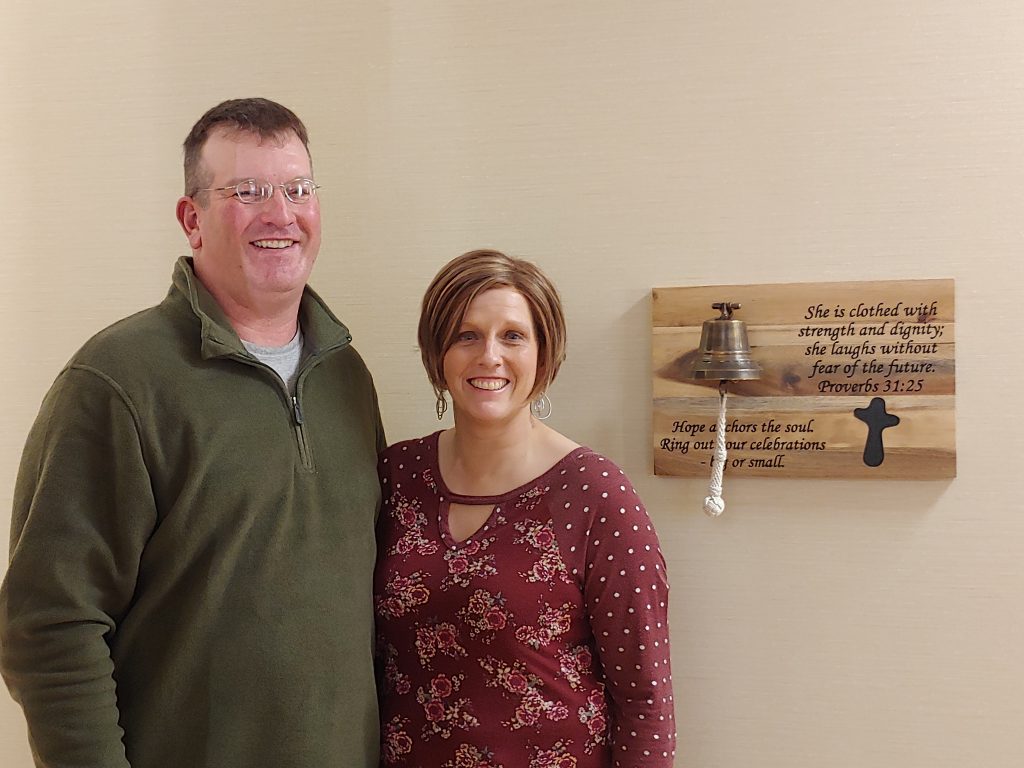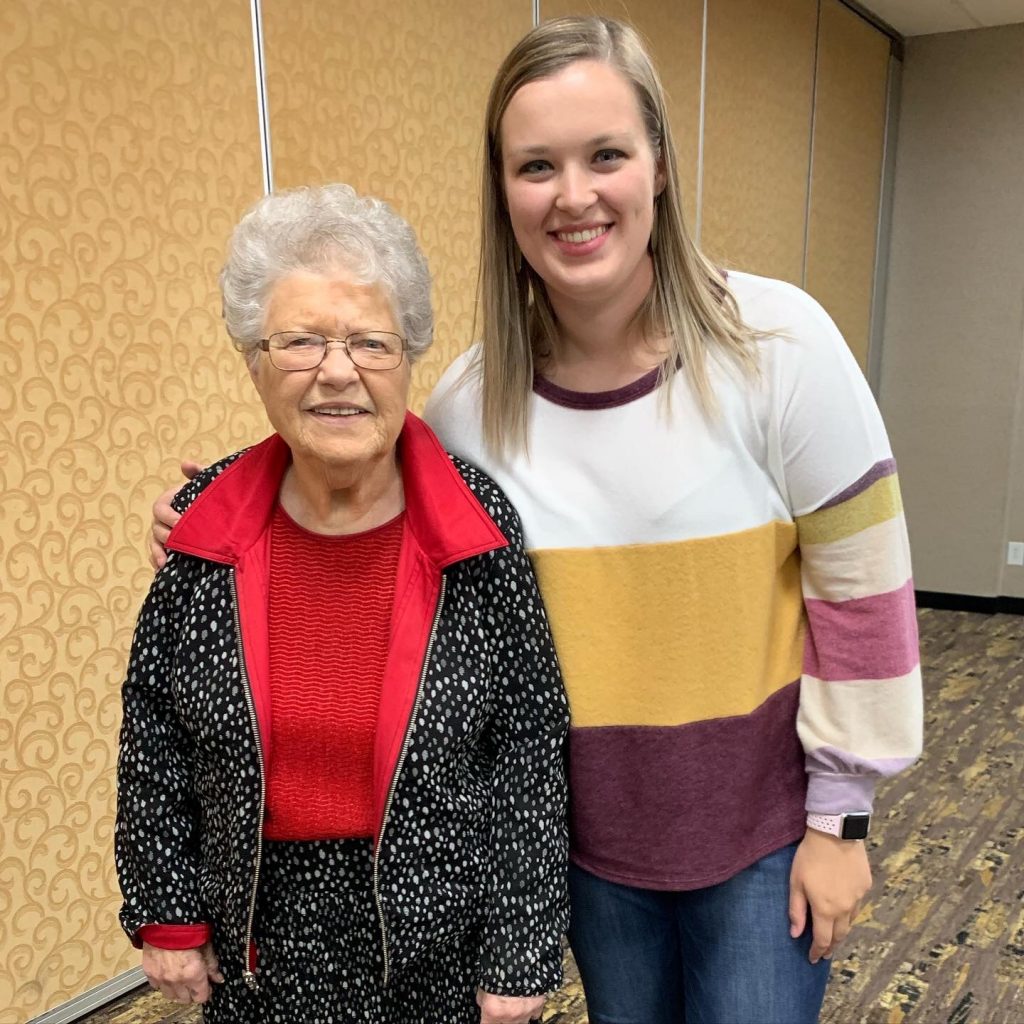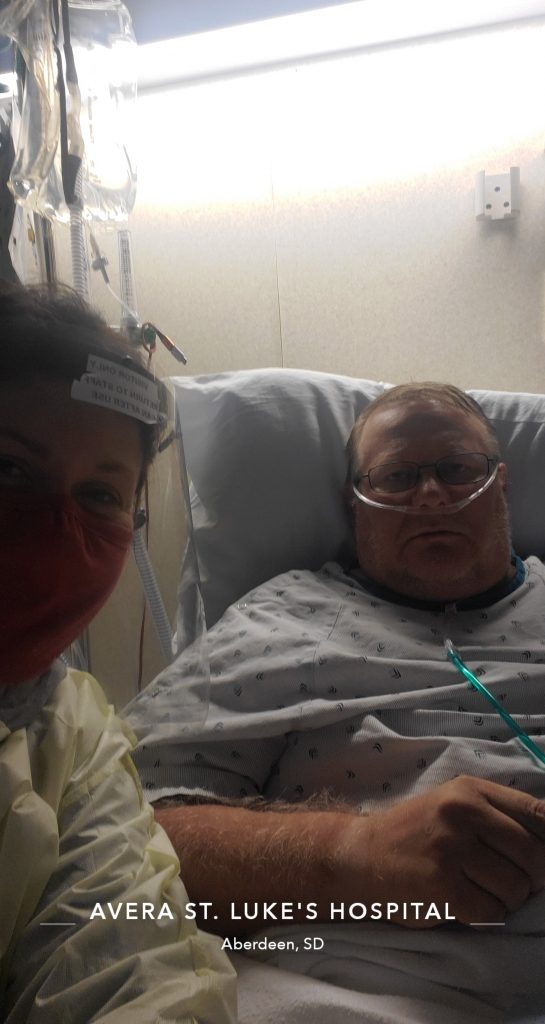COVID-19 Impacts S.D. Farmers Union Families
by Lura Roti
When the COVID-19 pandemic began closing schools and businesses in March, South Dakota Farmers Union members had just arrived home from the organization’s 118th National Convention Held March 1-3 in Savannah, Ga.
Throughout the months to follow, articles in the Union Farmer covered how this pandemic devastated our livestock industry and illuminated price fixing. We shared advice on how to protect ourselves and our families from healthcare workers closely connected to farms and ranches.
In this article, three SDFU families share what it is like when you or your family member is among the more than 102,000 South Dakotans to contract this highly contagious virus.
The Kolousek Family, Wessington Springs

Before extreme body aches motivated Amber Kolousek to get tested for COVID-19 September, 2020 was already proving to be a challenging year for the family.
In early August, Amber discovered she had 1B breast cancer. As she was undergoing aggressive chemotherapy treatments, the family took extra precautions that would hopefully keep her from contracting COVID. They wore masks whenever they were in public, they stayed home from the State Fair, they sat alone in the church balcony on Sundays.
But as the pandemic swept through Wessington Springs in early September, it got into the Kolousek household. “No one had a fever. We did experience fatigue, headaches and stomachaches. The entire time we had it, I was concerned it would get worse,” says Amber. “Scott and I know we were fortunate.”
Kolousek continued weekly chemo treatments. On Jan. 6, she completed her last chemo treatment and had some good news. “I responded to treatments well. The doctor showed me my first MRI, where you can clearly see a huge lump. On the most recent MRI, you can’t see anything. It’s gone.”
Before her cancer journey is over, Kolousek will undergo two surgeries scheduled for early spring 2021. “I’m not 100 percent out of the woods and I still do not have my energy back, but it is nice to be done with chemotherapy.”

The Schaunaman Family, Aberdeen
In February 2020, the Schaunaman family picked their 90-year-old mom, Hazel, up from the memory care assisted living home and took her and their dad, Don, out for a pancake breakfast after church. It was their 70th anniversary.
February 2021 finds the family is mourning the loss of Hazel. In November, Hazel contracted COVID and passed away. Her son, Kirk, says the family’s grief is compounded because due to COVID-19, Hazel and Don were not able to spend time together in the eight months leading up to her passing.
“Mom did not understand why she could not see Dad. And, when it was the end, Dad was finally able to be with her, but because of COVID, she was unconscious. The fact he couldn’t talk with her is what is really tough. Dad did not get closure.”
Schaunaman’s daughter, Kelcy recently reflected on what her Grandma Hazel meant to her in a recent KELOland News interview. “She loved her family. She loved being on the farm. She loved bringing people around the table,” Kelcy says, adding that her grandma spent many hours helping her and her cousins with their 4-H projects.
Don recently received the COVID-19 vaccine, and the Schaunamans hope this means he can spend more time together with their family.
The Johnson Family, Groton

Even though Chad Johnson never gets sick and did not have any underlying health conditions, he and his family took the COVID-19 pandemic seriously. “We wore our masks everywhere. Michelle wore one to work. Brenna wore one to work. Porter wore one to school and I wore one every time I went to town to get parts,” Chad explains.
Unfortunately, not all employees and customers at Brenna’s work wore them. In early October, Brenna and several other co-workers came down with COVID.
The entire Johnson family got sick. At first it seemed like Brenna had the worst symptoms. “I had to wake Brenna up every three hours so we could nebulize her,” Michelle explains.
But then, Chad began complaining that he was short of breath. “I feel guilty because at first I just thought he had ‘man-flu.’ I didn’t think he was that sick – until he passed out on me. Then, I knew something was really wrong,” Michelle says.
Michelle took Chad into the clinic in Groton. They put him on oxygen and called the ambulance. Michelle followed the ambulance to Aberdeen. Because he had COVID, she could not join him in the
Emergency Room.
She sat in the waiting room for five hours before she learned they were admitting Chad to the ICU. She was able to say goodbye before he was admitted. A few days later Chad contracted COVID pneumonia.
“It is 10 times worse than any other type of pneumonia. There is no cure other than time and prayers. And the stuff your lungs fills up with is different than anything I’d ever seen. It is clear and sticky,” Chad says.
Three days later, Michelle got a call from the hospital. “They told us to say our goodbyes because they didn’t know if he was going to come through the night or not,” Michelle says. “After sitting with him for several hours, we had to go home. Then we had to wait at home all night – until the next morning to find out if he had made it through the night. It was pretty tough.”
The hospice nurse noticed that Chad’s willpower increased after spending time with his family, so because Michelle had already had COVID, the nurse advocated for Michelle to be able to spend a few hours each evening with Chad.
“This is one of the most challenging things I have ever gone through. Being able to see my wife is what got me through it,” Chad says.
He explains that there were times he felt his body wanting to give up. Seeing Michelle each evening was a daily reminder not to give up. “I saw my share of people who did not make it. I could see the elevator from my room, and I saw a lot of people who left the hospital not breathing.”
During his 40 days in the hospital, COVID caused blood clots to form on his lungs. There was a time when doctors asked if they wanted to try putting Chad on a ventilator. Because the odds were about the same, and those patients who are ventilated and make it have a much more difficult time recovering, they decided to not to ventilate.
“We thought if we’re going to have a 50/50 chance on a ventilator, why not take the 50/50 chance off the ventilator,” Michelle explains.
She says it was difficult to see people around her behaving like everything was normal, and not wearing masks while Chad was in the hospital fighting for his life.
“One day I was in Hobby Lobby getting some crafts to work on while I sat with Chad at night and an entire family was in line with me without masks. They were standing kind of close, the cashier finally asked them to back up. I turned around and said, ‘You may think that this does not affect you, and it may not, but it affects other people. Right now, my husband is in the hospital fighting to live because of this COVID.’”
Today, Chad has much praise for the team of healthcare workers who helped save his life. “I cannot thank the Avera team enough. They were so caring and so professional. Those nurses and doctors were working their tails off,” Chad says.
Chad was in the hospital Oct. 9 through Nov. 20. When the day finally came for him to go home, 50 healthcare workers lined the hospital hallway as one of Chad’s favorite nurses, wheeled him out the door. Today, Chad still tires easily. He was able to go off oxygen the second week in January.
He and Michelle continue to wear masks in public and they are both eager to get their vaccine.
“I have seen plenty of Facebook posts where someone says their COVID was just like a cold or the regular flu, or that you have a 99 percent chance of not dying. OK, you have a 99 percent chance. But what happens if that 1 percent happens to be your wife, your husband, your son or daughter? The other 99 percent doesn’t matter when your family member is one of the 400,000 deaths.”
To learn about when and where you can access your COVID-19 vaccine, contact your healthcare provider or visit https://doh. sd.gov/COVID/

